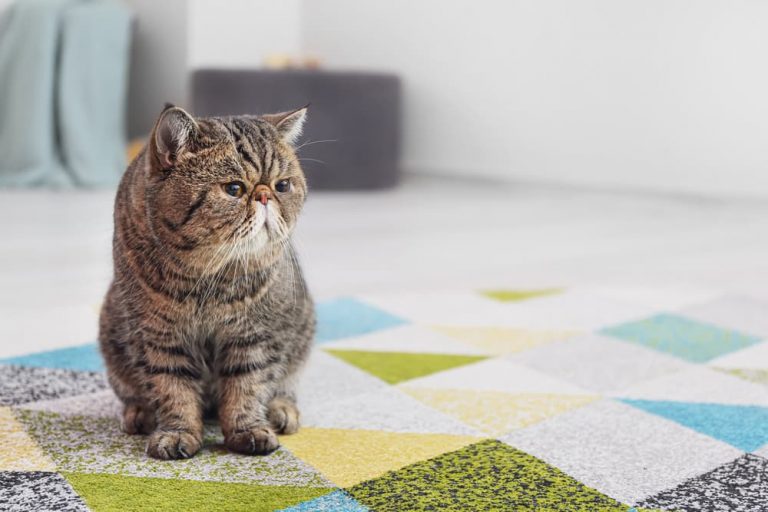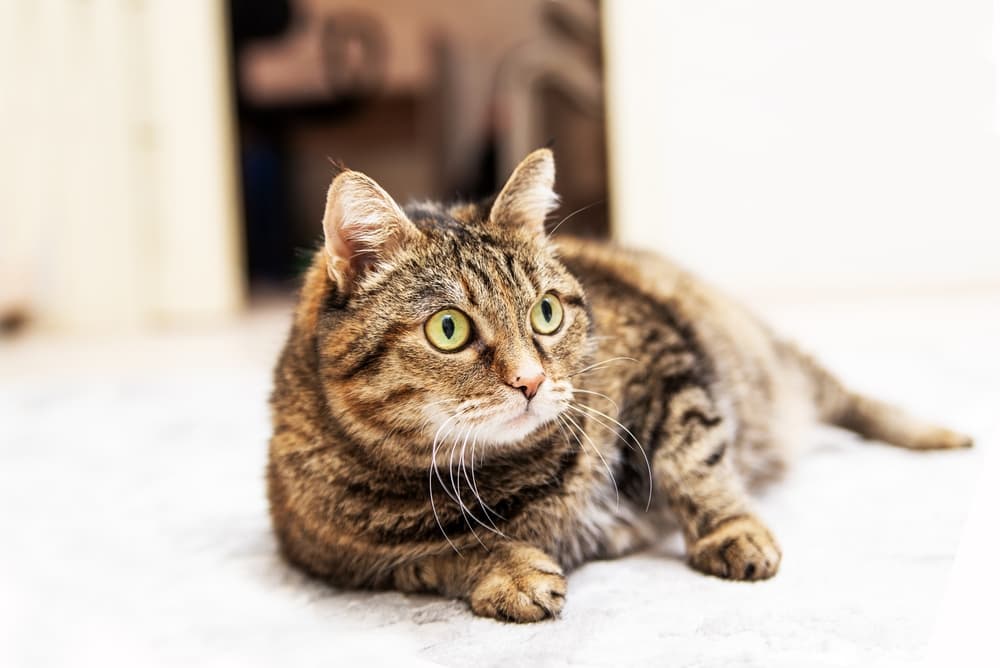Cat Scooting: Why It Happens and How to Stop It

Cat scooting is kind of funny. Your cat places their butt directly on the ground, stretches out those back legs, and uses their front legs to propel themselves around while dragging their hind end. But it turns pretty gross when their scooting leaves poop on your floor.
Some cats do this occasionally, and others frequently — sometimes every day. This may cause you to ask yourself questions like: Why is my cat scooting on the carpet? What can I do to decrease scooting? Is it a sign of discomfort or a health problem? Read to find out.
Why Is My Cat Scooting?
A cat rubbing their butt on the ground is a natural behavior, and it is normal to see it on occasion. You may notice it a couple times per week at the most, for a short amount of time during each scoot.
The most common reasons cats scoot are to clean poop from their butts or stimulate their anal glands. Anal glands are right on the anus, the opening from the rectum (large intestine inside) to the outside. The glands contain stinky liquid that can mark territory. This is why you might see your cat scooting after pooping.
But if your cat’s wiping their bum on the floor every day, or if the amount of scooting per day starts to increase, there may be several medical reasons why:
- Dermatitis (skin inflammation) in the area of the butt
- Vaginitis (inflammation of the vagina in female cats)
- Proctitis (inflammation of the end of the large intestine a.k.a. the rectum)
- Anal gland disease
- Tapeworm infection
- Bladder or urethral inflammation (Feline Lower Urinary Tract Disease or FLUTD)
Obesity often leads to dermatitis around the butt, since your cat cannot properly groom the area. Allergies cause inflammation in many places, including the inside of the rectum. You may notice diarrhea if your cat has proctitis. Flea infestation can result in tapeworm infection. Tapeworm segments may appear in poop or on the butt itself and are off-white and rice-sized. If you notice your cat urinating outside of the litter box, they could be experiencing FLUTD. A change in the urine, such as red hue, can also indicate FLUTD.
Anal gland disease in dogs is relatively common; it is uncommon in cats and likely not the cause of scooting.
As you can see, there are many things that can lead to a cat wiping their bum on the floor. Having a pet health insurance policy in place can help keep veterinary costs down. The folks at Lemonade offer customizable plans that start as low as $10. You can do everything from signing up to making a claim on their mobile app.

- Simple sign-up and speedy claims payments.
- Easily file claims using the AI-powered Lemonade mobile app.
- Customize your coverage with add-on preventative plans.
What Should You Do If You See Your Cat Scooting?

If your cat is scooting, allow them to finish. But if you see your cat rubbing their butt on the ground and wish for them to stop, do not yell or “punish” them in any way. Since scooting is a natural behavior, this will frighten your cat and lead to other issues. Try to distract them with their favorite toys or treats instead.
After your cat finishes scooting, lift their tail and look closely around the butt. Is there any poop or debris in the fur? Does the skin around the butt look red or crusty at all? Is there any fur missing? If so, you should schedule a veterinary examination.
Using a warm washcloth or unscented pet wipes, you may gently try to wipe away debris. If your cat reacts strongly, or the debris does not come off easily, stop and call your veterinarian.
Do not attempt to express your cat’s anal glands at home! Most cats will not allow this and it could cause more harm than good.
If the scooting increases, schedule a veterinary examination, even if the skin around the butt looks normal. Most of the causes are not clear to us.
Other clues of what might be causing scooting include:
- A history of allergies or itchy skin
- Changes in urination, such as red urine or peeing outside the litter box
- Diarrhea
- Rice-sized off-white granules in the poop
Cat Scooting Treatment

The first way to treat cat scooting is to keep your cat’s butt clean. If any poop is stuck to the fur, your cat will often scoot. If this does not resolve the issue, veterinarians will often try a variety of remedies that may help.
Examples of treatments for cat scooting include:
Steroids, such as prednisolone. Steroids may be helpful in reducing inflammation. However, they are not recommended for long-term use.
Immunomodulators like Atopica. These can be helpful if your cat’s scooting is caused by a chronic condition, like allergies.
New diet that is protein-restricted. Beef, chicken, and fish are the most common causes of food allergies in cats. Prescription diets, such as Royal Canin Hydrolyzed Protein HP cat food, can help avoid these common allergens and decrease inflammation.
Antibiotics. Your veterinarian may prescribe an antibiotic like Clindamycin for anal sac disease or a skin, bladder, urethra, or vagina infection.
Anal gland expression. To examine anal glands, your veterinarian has to put a gloved finger into your cat’s butt. (Warning: not all cats will allow it.) Expressing the glands can allow your veterinarian to detect an infection. This may help relieve symptoms, although it is unlikely.
Topical ointments, mousse, or shampoos. Your veterinarian may recommend a prescription shampoo or topical medication for inflamed areas. Some common choices include Cerasoothe CHX Antiseptic Shampoo. and Animax Ointment.
Tapeworm medication. To kill your cat’s tapeworms, your veterinarian may prescribe a medication, such as Droncit or praziquantel.
Pain medications. To rule out pain or discomfort, your veterinarian might prescribe a medication like Meloxidyl Oral Suspension.
Home Remedies for Cat Scooting

There are many things you can do at home to try and help your cat’s butt-dragging issue.
Cleansing wipes
Try removing debris by gently wiping your cat’s butt with a medicated cleansing wipe. Look for animal-specific options, such as Cerasoothe CHX+KET Antiseptic Wipes or Mal-A-Ket Wipes. Before using wipes designed for humans, such as those meant for hemorrhoids, talk with your veterinarian to confirm they are safe.
A high-quality canned diet
Increased water intake may help if your cat has urinary (bladder) issues. In this case, an option like Royal Canin Urinary SO wet cat food may be a good choice. Canned cat food diets have fewer carbohydrates than dry, which may help decrease diarrhea.
Increased fiber intake
Psyllium fiber can help “bulk up” your cat’s poop, allowing the anal glands to express more frequently. Consider switching to a fiber-rich diet, such as Hill’s Prescription Diet Digestive/Fiber Care. You can also add a fiber supplement like Vetasyl. Watch for a response over a couple weeks.
Monthly flea prevention
Consistent flea treatments can help prevent fleas and, thus, tapeworms! Credelio chewable tablets or Revolution Plus topical treatment are some common choices.
Controlling how much your cat eats every day
Overweight or obese cats will not be able to groom properly. This may lead to dermatitis and scooting. If your cat is overweight, speak with your veterinarian about switching to a weight management diet. Depending on your cat’s needs, your veterinarian may recommend prescription or non-prescription food. Some common options include Purina Pro Plan Veterinary Diets OM Overweight Management cat food or Hill’s Science Diet Perfect Weight cat food.
Cat Scooting: The Bottom Line
Cat scooting is a normal behavior, but it can be a sign of discomfort if it is frequent. Most of the time, you can’t tell why your cat is rubbing their bum on the floor, so you’ll need your veterinarian’s help.
Keep a close eye on your cat’s weight, and ensure they’re keeping their butt clean. Monitor your cat for any other concerns such as changes to their poop or urine habits.









